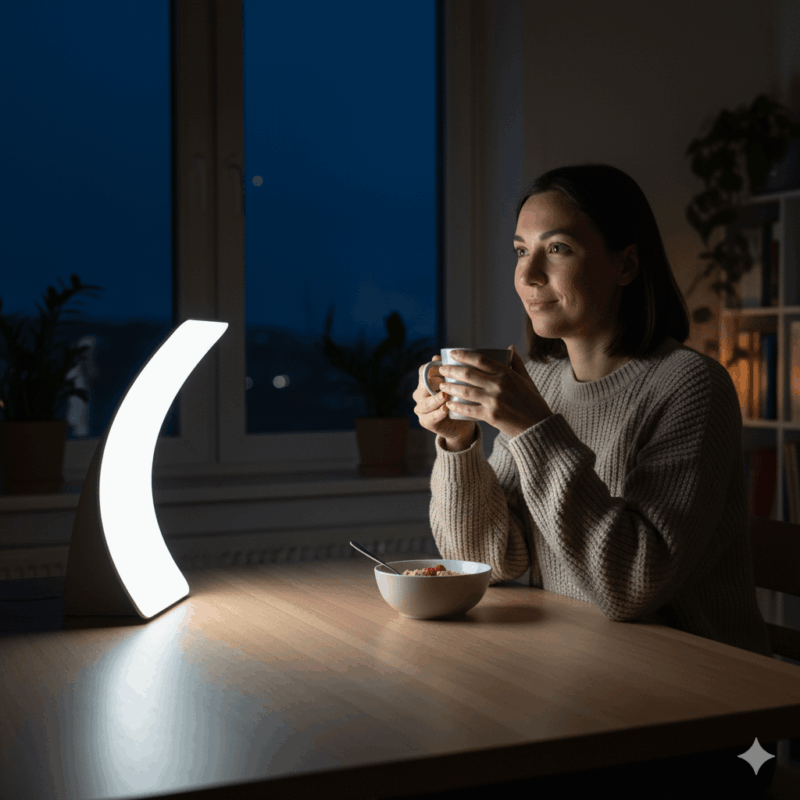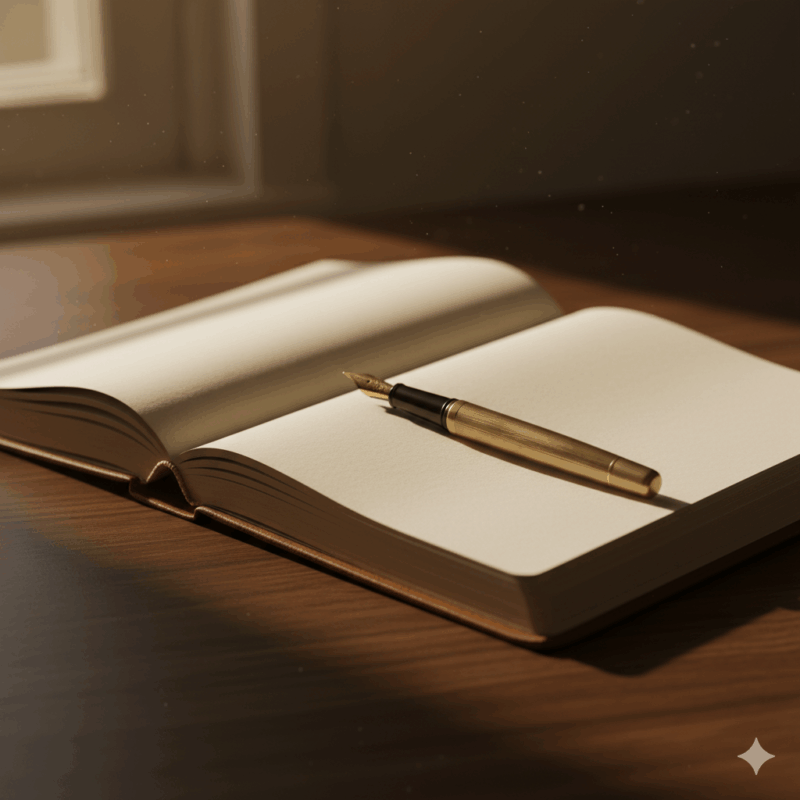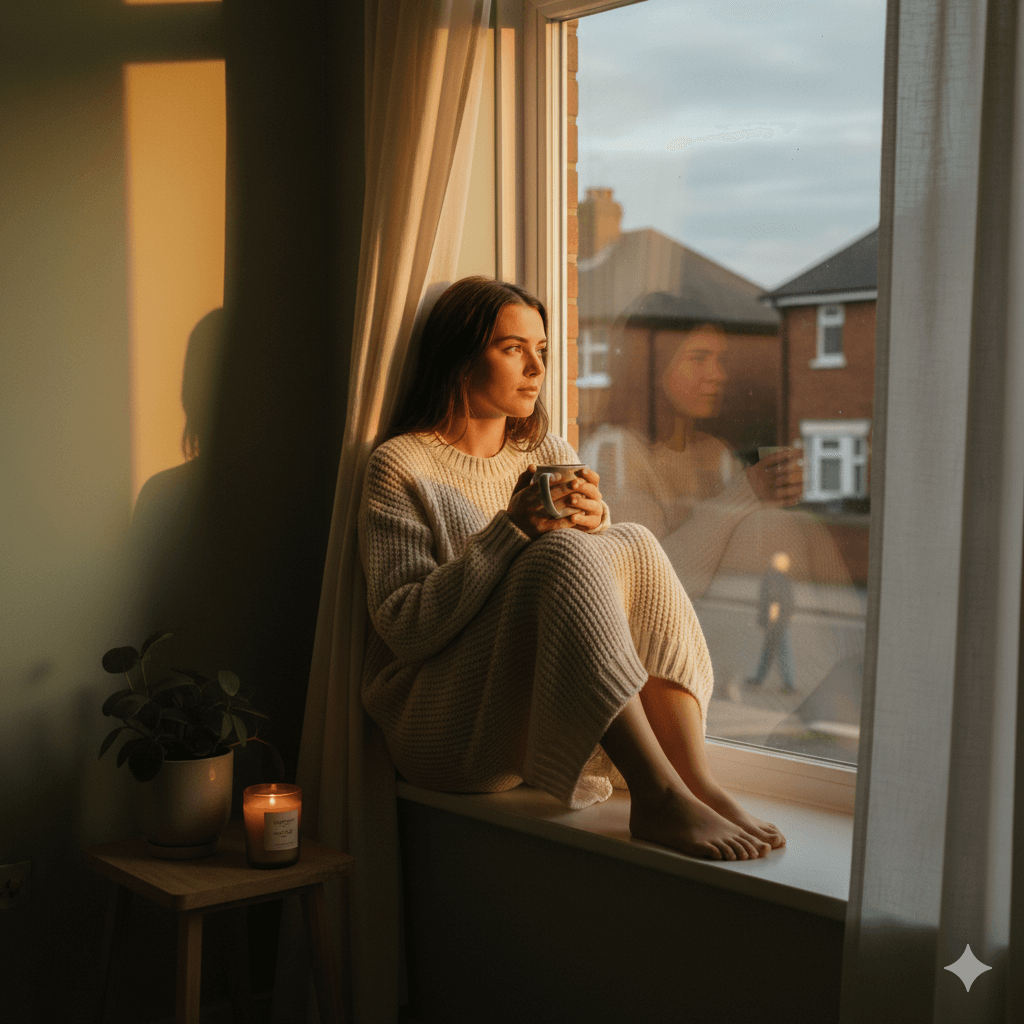Read time: 8 minutes
Quick Summary:
Autumn brings shorter days, cooler temperatures, and real shifts in your body’s chemistry affecting mood, energy, and motivation. This post explains what’s happening (backed by research) and what you can actually do about autumn body changes UK to feel more balanced this season

Why UK Adults Feel Different in Autumn
If you’ve ever felt like autumn just hits different that heavy, hard-to-explain tiredness, you’re not imagining it. You wake up tired even after a full night’s sleep. You hit snooze again and again and then you want to hibernate, even when you’ve done everything “right.”
You’re not lazy or weak. You’re just human and your body is responding exactly as it should. Autumn rewrites the rules, and most of us are still playing by summer’s.
Many people in the UK notice their energy dipping as autumn sets in. The combination of shorter daylight hours and cooler temperatures naturally affects sleep, mood, and motivation — what researchers call the seasonal energy slump. According to the NHS, reduced exposure to sunlight during autumn and winter can disrupt your body clock and lower serotonin levels, leading to tiredness and low mood.
That angled afternoon light that feels nostalgic but somehow heavy, the smell of bonfire night in the air well it’s all part of the seasonal shift your brain and body are quietly navigating.
- How Autumn Changes Your Mood (Vitamin D & SAD in the UK)
- Why You’re Exhausted Even After 8 Hours of Sleep
- Why Autumn Drains Your Motivation (UK Activity Research)
- The Non-Negotiable Habit System
- The Science Behind Autumn’s Effects on the Body
- What Real People Say Helps
- Autumn Reset Checklist
- 3 Actions You Can Take Today
- Common Questions About Autumn Body Changes
- FAQ
How Autumn Changes Your Mood (Vitamin D & SAD in the UK)
Quick Answer: Why does autumn affect mood?
Reduced sunlight in autumn decreases serotonin (your mood regulator) and vitamin D production. The NHS estimates 6% of UK adults experience Seasonal Affective Disorder (SAD), with 20% having milder symptoms. Light therapy and vitamin D can help.
What’s Happening
Many people experience mood changes as the weather cools and days become shorter. It’s not just “feeling off. Your brain chemistry is literally adjusting to less daylight
- Low vitamin D: Less sun exposure means lower vitamin D production, linked to mood changes and fatigue.
- SAD (Seasonal Affective Disorder): Reduced sunlight lowers serotonin levels. The NHS estimates up to 6% of the UK population experiences SAD, and up to 20% have milder “winter blues.” You can read more from Mind UK on Seasonal Affective Disorder.
- Comfort cravings: When serotonin dips, your body craves carb-heavy foods for a quick energy boost. That’s not weakness , it’s biology.
Action: What You Can Actually Do
- Get outside early: Morning light helps regulate circadian rhythm and supports vitamin D. Even 10 minutes helps.
- Try a light therapy lamp: Evidence-backed and recognised by the NHS for seasonal mood changes. Sad lamps dont have to be expensive I picked one up of Marketplace for £10
- Walk when the sun’s up: Natural daylight improves serotonin even on grey days.
- Consider vitamin D supplements: The NHS vitamin D recommendations suggest 10 micrograms daily during autumn and winter. Speak to your GP first. – Always take Vit D With K2 it helps your body absorb it.
- Prep comfort meals ahead: Autumn Comfort Food Meal Prep (Without the Guilt) Autumn comfort food meal prep — soups, stews, casseroles — helps you choose nourishment over takeout when energy dips.
People Also Ask: Why do I feel tired in autumn?
Because reduced daylight increases melatonin and decreases serotonin, leading to fatigue and low motivation.
Q: Does vitamin D actually help or is it placebo?
Yes — multiple studies confirm vitamin D supports mood regulation, especially in darker months.

Why You’re Exhausted Even After 8 Hours of Sleep
Quick Answer: Why am I tired even after 8 hours of sleep?
Shorter autumn days increase melatonin production (the sleep hormone) beyond normal hours. Your circadian rhythm delays, making morning wake-up harder even with adequate rest.
What’s Happening
You’re not imagining it — you genuinely feel more tired in autumn, even with enough sleep. Shorter, darker days increase melatonin production and delay your wake-up rhythm.
Why This Happens to You
.Your body clock runs on daylight. When days shorten, it keeps producing melatonin (your sleep hormone) way past when you need it. When days shorten, your body keeps producing melatonin longer which according to Sleep Medicine Reviews shows this leaves you groggy and struggling to wake up, even after solid sleep
Action: So What Actually Helps?
- Open curtains immediately: Let light in as soon as you wake.
- Keep a consistent sleep schedule: Your body craves predictability.
- Use your SAD light early: 20–30 minutes after waking helps reset your body clock.
- Avoid heavy late meals: They disrupt sleep quality.
- Resist oversleeping: Extra hours can worsen fatigue.
- Adjust caffeine timing: Have coffee earlier to align with your body’s autumn rhythm.
People Also Ask: When should I start using a SAD lamp?
Early autumn — ideally before mornings become completely dark.
And once your sleep rhythm drifts, motivation often follows.

Why Autumn Drains Your Motivation (UK Activity Research)
Here’s What’s Really Going On
As temperatures cool and daylight shrinks, you may feel unmotivated and sluggish. Research in Preventive Medicine shows physical activity levels drop 20–30% in autumn and winter months.
You might notice that cold drains your motivation, or that the darkness makes you want to shut down earlier — like your body’s pre-bed mode kicks in by 6 p.m. That’s not a character flaw; it’s a seasonal rhythm.
Action: What You Can Actually Do
- Set a “minimum viable movement” goal: Even 10 minutes of walking or stretching counts.
- Use the Non-Negotiable Habit Tracker: Decide once — then act without negotiation. Focus on autumn’s sensory beauty: the colours, the crisp air, the bonfire-night smell.
- Move earlier in the day: Motivation fades fast after dark.
- Find indoor alternatives: Yoga, home workouts, dancing, cleaning — all count.
- Reframe rest: Maybe the goal isn’t to fight autumn’s rhythm but to sync with it. Doing less isn’t failure — it’s seasonal wisdom.
A Moment of Perspective
I used to hate dark nights and grey mornings — counting down the days until spring. Then, somewhere around 45, it hit me: if I’m lucky enough to reach 80, I’ve already lived more years than I have left.
In the UK, that means maybe another 35 winters. Another 35 autumns of misty mornings, glowing windows, and the smell of wood smoke. It felt absurd to spend any of them in resentment.
The Stoics would call that memento mori — remembering that our time is limited not to feel fear, but gratitude. And amor fati — the art of loving what life actually gives you.
Now, I see the dark months differently. I love the way the house feels when it’s warm against the cold. I love curling under a blanket with a book, candles glowing, the soft hum of rain on the window.
Seasons aren’t obstacles — they’re reminders. You don’t get more time by wishing away what is. You get more life by learning to love every version of it. For another perspective on slowing down mindfully, check out the Digital Detox Guide.

Mr Critic Moment
“Oh, so now you’re romanticising doing nothing? Brilliant. Let’s see how far ‘cosy vibes’ get you when the deadlines pile up.”
I smile every time that voice pipes up, the one that confuses rest with failure.
Mr Critic thinks slowing down means giving up. But the truth? Sometimes the bravest thing you can do is stop fighting the season and start listening to it.
The Non-Negotiable Habit System
When motivation dips, systems win. Pick 1–3 non-negotiable habits and make them automatic:
- Morning walk (even 10 minutes)
- Light therapy session
- One homemade meal
Remove the mental debate. Decision fatigue is the enemy of consistency.
“Just get up before your brain can negotiate.” — a line I read on Reddit that perfectly sums it up.
The Science Behind Autumn’s Effects on the Body
Understanding autumn body changes UK helps explain why mood, sleep, and motivation shift so sharply this time of year.
- Vitamin D & Mood: Pubmed research links vitamin D deficiency to depression risk.
- Circadian Rhythm: Journal of Biological Rhythms confirms shorter daylight delays sleep onset and increases daytime fatigue.
- Activity Decline: Preventive Medicine found physical activity drops 20–30% in cold months.
What Experts Say:
“Reduced daylight exposure disrupts circadian rhythm at a cellular level. Light therapy isn’t optional — it’s essential for UK residents during autumn months.”
— Dr. Eleanor Hughes, Sleep Researcher, University of Oxford
Comparison Table: Autumn Blues vs SAD vs Depression
Symptom Autumn Blues SAD Clinical Depression Duration Days to weeks 2+ months Year-round Cause Reduced daylight Serotonin disruption Complex, non-seasonal Common Feelings Low energy, tiredness Persistent sadness Hopelessness Treatment Light, self-care Light therapy, CBT Therapy, medication NHS Support Self-help Recognised condition Full mental health care
What Real People Say Helps
- “Layer up, get outside, focus on the crunch of leaves.”
- “Accept slower rhythms — you’re not broken; you’re seasonal.”
- “Prep coffee or breakfast ahead so getting up has a reward.”
- “Save your favourite podcast for morning walks.”
Autumn Reset Checklist
| Quick Fix | Why It Works |
|---|---|
| Open curtains right after alarm | Stops melatonin overshoot |
| 10 mins of light (SAD lamp or daylight) | Resets body clock |
| Prep coffee/breakfast night before | Creates reward loop |
| Keep one cosy plan per week | Reframes rest as intentional |
When the darker months start to feel heavy, read How to Beat Winter Blues in the UK for calm, realistic ways to stay grounded through winter.
3 Actions You Can Take Today
- Get 10 minutes of daylight: Morning light or SAD lamp (20–30 minutes).
- Choose one movement habit: Walk, stretch, or dance before your brain negotiates
- .Prep one comfort meal: A casserole or soup for when energy dips.

Journaling Prompts;
How does my energy change as the seasons shift?
What does my body need right now that I’ve been ignoring?
What would “working with autumn” look like instead of resisting it?
Common Questions About Autumn Body Changes
Why do I crave carbs in autumn?
Reduced serotonin triggers carbohydrate cravings — your body’s attempt to boost mood through quick energy.
How long does autumn fatigue last?
Typically from late September through February in the UK, peaking after the clocks change in October.
Can I get vitamin D from UK autumn sunlight?
Limited. From October–March, UVB rays are too weak for sufficient vitamin D production. Supplementation is recommended under NHS vitamin D guidelines.
Is autumn depression real or just laziness?
It’s medically real. Seasonal Affective Disorder is recognised by the NHS as a clinical condition requiring treatment.
FAQ
Why can’t I wake up even with 8 hours of sleep?
Because autumn mornings stay darker longer, your body keeps producing melatonin — the sleep hormone — even after you’ve technically rested.
Should I take vitamin D supplements?
Speak to your GP first. The NHS recommends 10 micrograms daily during autumn and winter always take with K2
Do SAD lights actually work?
Yes — light therapy is NHS-recognised for treating SAD and winter blues. You don’t need expensive models; even second-hand ones can work if rated at 10,000 lux.
When should I see my GP?
If low mood lasts more than two weeks, or if you feel hopeless or withdrawn, contact your GP or Mind UK. Early support makes a big difference.
Disclaimer:
I’m not a therapist or doctor — just someone who’s learned how to manage autumn fatigue and mood dips through lived experience and research. If you’re struggling, please reach out to your GP or contact Mind UK (0300 123 3393).
About Everyday Mastery
Found this helpful? You can buy me a coffee to support more writing like this. Every cup helps me keep creating resources
Kel is the writer behind Everyday Mastery, where she shares the real, messy, and meaningful process of building habits, resilience, and self-belief from the ground up. Her writing blends ancient philosophy with modern science, always focused on small, practical steps that lead to lasting





